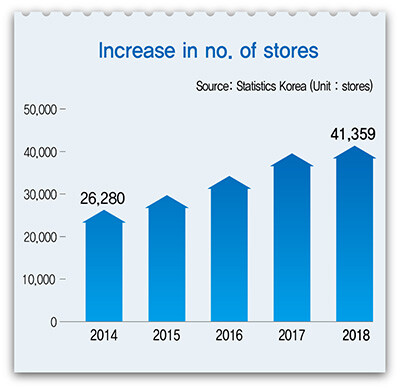hankyoreh
Links to other country sites 다른 나라 사이트 링크
S. Korean convenience store franchises expand overseas

South Korean convenience stores have been expanding overseas at a rapid rate. It’s part of a strategy of finding avenues abroad after being faced with the threat of stagnant growth at home as regulations on opening stores near other establishments have made it difficult for new stores to be established in South Korea. A trend of benchmarking the “South Korean convenience store model” is also emerging in Japan, which was first to introduce its own convenience stores.
Emart 24 announced on Mar. 4 that it was exporting 15 products from its independent “I’m e” brand to Australia and other countries. Thirteen I’m e snack foods and one variety of tissues are to be sold at around 110 stores in Sydney, it said. Instant noodles, crackers, and other products under CU’s Heyroo brand are currently being exported to around a dozen countries, including the US and China, while products under GS25’s You Us brand are being sold in 17 countries.
In some cases, the convenience store model itself is being exported. BGF Retail, which established its independent CU brand after parting ways with the Japan-based Family Mart chain in 2012, branched out into Mongolia in 2018 and plans to open its first store in Vietnam during the first half of this year. Japan and other countries are reportedly benchmarking the in-store dining tables first introduced by CU in South Korea in 2012.
“Japan’s convenience stores are larger in area than South Korea’s, but they’re takeout-focused, and they haven’t had tables in their stores,” a CU executive explained, describing the development as “a case of Japan benchmarking the South Korean convenience store model.”
Also attracting notice overseas is the model of allowing franchise operators to opt for 24-hour operation according to their store’s situation. On Feb. 11, the Japanese economic newspaper Nikkei focused its attention on the Emart 24’s policy of not requiring owners to operate around the clock. As a late starter in the convenience store industry, Emart 24 moved early on in its expansion in 2004 to allow franchise owners to choose their own hours; currently, around 80% of its stores do not operate on a 24-hour basis.
In Japan, an active debate has been focusing on whether convenience stores should be obligated to operate 24 hours a day even amid a decline in late-night sales.
Observing that “10% to 20% of branches of the top three convenience stores [in addition to Emart 24] are operated with reduced hours,” the Nikkei observed.
“Innovations in South Korea are proceeding a step ahead Japan,” it said.
By Shin Min-jung, staff reporter
Please direct comments or questions to [english@hani.co.kr]

Editorial・opinion
![[Column] The state is back — but is it in business? [Column] The state is back — but is it in business?](https://flexible.img.hani.co.kr/flexible/normal/500/300/imgdb/original/2024/0506/8217149564092725.jpg) [Column] The state is back — but is it in business?
[Column] The state is back — but is it in business?![[Column] Life on our Trisolaris [Column] Life on our Trisolaris](https://flexible.img.hani.co.kr/flexible/normal/500/300/imgdb/original/2024/0505/4817148682278544.jpg) [Column] Life on our Trisolaris
[Column] Life on our Trisolaris- [Editorial] Penalties for airing allegations against Korea’s first lady endanger free press
- [Editorial] Yoon must halt procurement of SM-3 interceptor missiles
- [Guest essay] Maybe Korea’s rapid population decline is an opportunity, not a crisis
- [Column] Can Yoon steer diplomacy with Russia, China back on track?
- [Column] Season 2 of special prosecutor probe may be coming to Korea soon
- [Column] Park Geun-hye déjà vu in Yoon Suk-yeol
- [Editorial] New weight of N. Korea’s nuclear threats makes dialogue all the more urgent
- [Guest essay] The real reason Korea’s new right wants to dub Rhee a founding father
Most viewed articles
- 1[Column] Why Korea’s hard right is fated to lose
- 2Amid US-China clash, Korea must remember its failures in the 19th century, advises scholar
- 360% of young Koreans see no need to have kids after marriage
- 4[Column] The state is back — but is it in business?
- 5[Column] Can Yoon steer diplomacy with Russia, China back on track?
- 6[Editorial] Stagnant youth employment poses serious issues for Korea’s future
- 7Hybe-Ador dispute shines light on pervasive issues behind K-pop’s tidy facade
- 8Inside the law for a special counsel probe over a Korean Marine’s death
- 9Japan says it’s not pressuring Naver to sell Line, but Korean insiders say otherwise
- 10USFK sprayed defoliant from 1955 to 1995, new testimony suggests